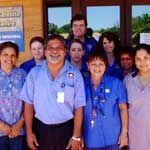
The Kimberley Satellite Dialysis Service is truly unique.
Run by the Broome Regional Aboriginal Medical Service (BRAMS), it’s the first community-controlled, Aboriginal health organisation-operated tertiary dialysis unit in Australia.
This groundbreaking service employs Aboriginal health workers to look after Aboriginal kidney patients. Aboriginal health workers work side-by-side with registered nurses to deliver clinical care for their own people.
BRAMS was a winner in the Service Delivery category in the recent inaugural 2007 National Excellence Awards in Aboriginal and Torres Strait Islander Health.
The awards, conducted by the Department of Health and Ageing, showcase and celebrate the achievements of the Aboriginal and Torres Strait Islander health sector in bridging the gulf between the health status of Aboriginal and Torres Strait Islanders and other Australians.
They are also a timely reminder of the dedication over the past 30 years and more by both Indigenous and non-Indigenous people to bridging that gulf.
The central aim of the Kimberley Satellite Dialysis Service is to treat kidney patients at home, on their own lands, or as near as possible to them. A much-needed service in a region that has one of the highest rates of end stage renal failure in the world, it has become a model for other organisations around the country. It’s a showcase of what can be achieved in the delivery of Aboriginal health care.
The Kimberley Satellite Dialysis Service has consistently delivered an innovative, culturally appropriate service, a high standard of clinical care – and a vastly improved quality of life to its more than 40 patients. This is not only in the obvious clinical benefits of dialysis, but also in reuniting families, which is a very important part of providing the best possible health care.
As well as Aboriginal health workers working alongside nurses, there are drivers who bring patients to and from dialysis. A social worker is attached to the service, as is a GP. A nephrologist ( a kidney disease specialist) visits from Perth about once a monthl. In addition, the service, via BRAMS, has taken on a role in the delivery of care to peritoneal dialysis patients around the region. Being attached to BRAMS also facilitates the delivery of primary health services to these patients, thus enabling holistic care.
“This service is genuinely groundbreaking – and the reason it works so well is that it is being run by an Aboriginal controlled health organisation,” says Kay Atfield, director of the Kimberley Health Service. “All bar one of the clients is Indigenous.
“The service also employs a lot of Indigenous workers, which is a big bonus. BRAMS endeavours to employ Indigenous people and also provides the training to get Aboriginal health workers up to speed. It makes the clients more comfortable and more likely to attend the service.
“Winning this award is a thrill for all and recognition of the work they do and the way they do it.
“They are a good mob.”
Comments are closed.